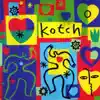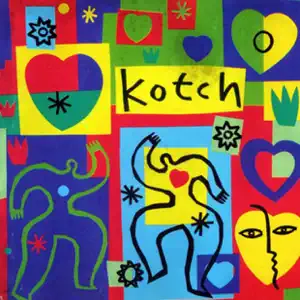


Acerca de Kotch
Kotch have been in existence since 1981, although only drummer Steven Lee and his guitarist uncle Pablo Stewart have remained constant. First called Psalms, the band offered straightforward roots reggae at a time when dancehall was starting to become popular. Their first single, ‘In The Hills’, produced by themselves and Third World’s Willie Stewart, flopped, but it was followed by the better-received ‘Ska-ba’, produced by Ibo Cooper, also from Third World. By that time, in 1982, their lead singer, Parry Hinds, had been replaced by the distinctive, soulful baritone of Rueben ‘Norman’ Espuet and the line-up settled to Espuet, Lee, Pablo Stewart, Ian Heard (saxophone), Al Wilson (trombone), Earl Thorpe (bass) and Herbie Harris (keyboards). Four singles arrived in 1983, the last two, ‘Head Over Heels’ and ‘Jean’, charting in Jamaica. Their first album, Sticks And Stones, was also issued that year. Steven Lee’s other job, at his father’s Sonic Sounds record distribution company in Kingston, gave Kotch an important connection. Upstairs at Sonic Sounds was a tiny computerized studio, Megabyte, that Sly Dunbar rented. Kotch’s keyboard player, Herbie Harris, became resident programmer and, with reggae changing in 1986 to a fully digital sound, Sly was looking for his Taxi label to follow suit. In 1988 it arrived: a rocking, woodblock snare, a subsonic, growling bass, and a simple keyboard and guitar arrangement that owed something to rocksteady. When Dunbar needed a voice, he simply called on the band downstairs, but Kotch’s first new hit, ‘Cruising’, caused confusion. Many believed that it was the work of a girl group, as Espuet’s baritone had been sidelined for a falsetto worthy of the Stylistics. An appearance at the Reggae Sunsplash festival in 1988 confirmed that it was Espuet with the high-rise larynx. ‘Cruising’ hit number 1 in Jamaica, and it was quickly followed by ‘Tears’ (a Top 10 hit) and a cover version of Smokey Robinson’s ‘Ooh Baby Baby’, which Mango issued in England to considerable reggae chart success. ‘Heartbreak’, a cover version of Eric Clapton’s ‘Wonderful Tonight’, and ‘Tracks Of My Tears’ have all since sold well. The album Kotch was released internationally and to support it they toured Africa, South America and Europe and played extensively, backing singers and DJs in Jamaica - a facet of their work that success forced them to abandon. ‘Don’t Take Away’ with U-Roy, and ‘Clock’ maintained their profile into the 90s.
Nosotros
Notas
